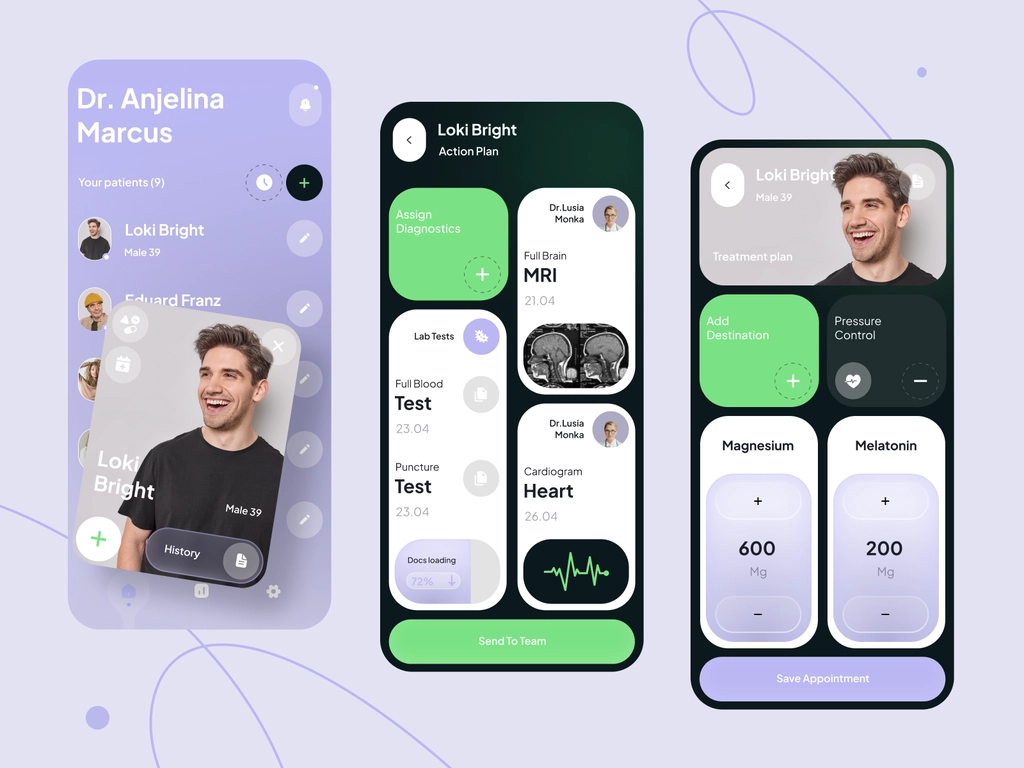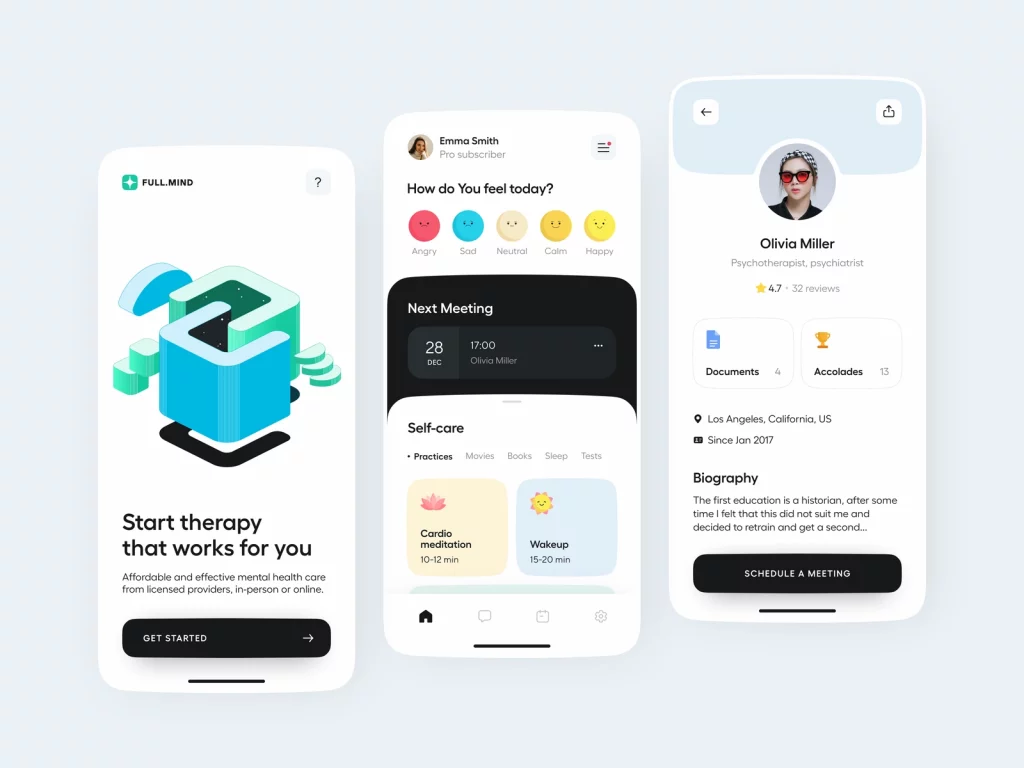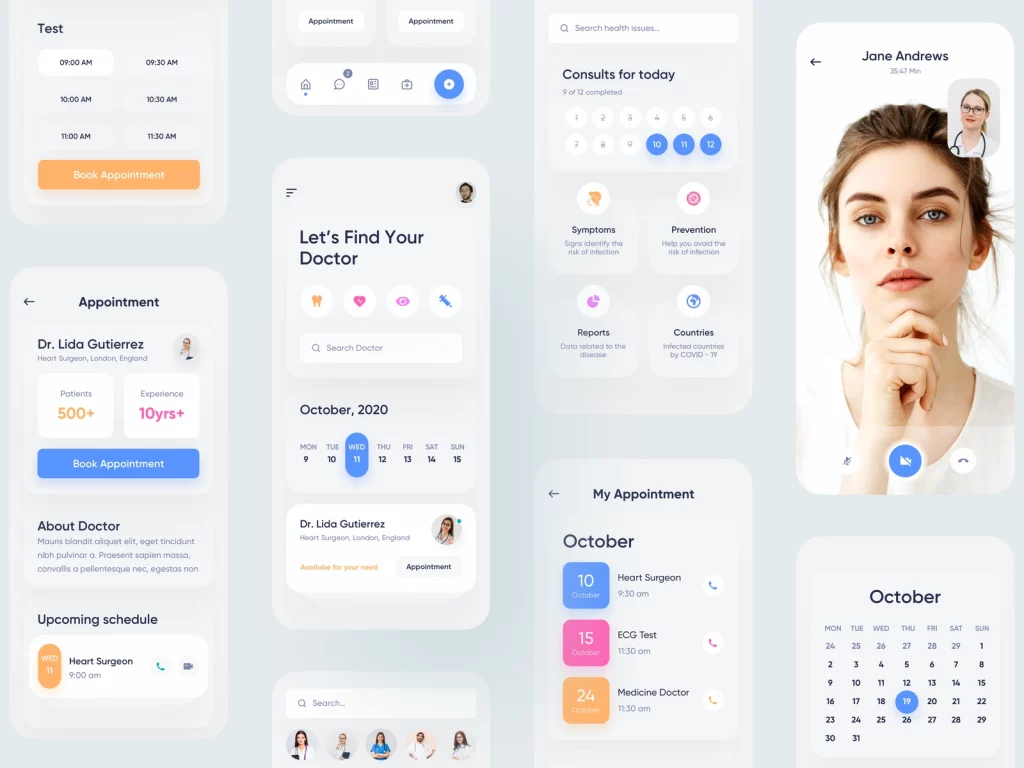In a world where innovation reigns supreme, the healthcare industry stands at the forefront of transformation, yearning for groundbreaking solutions to overcome its inherent challenges. As entrepreneurs and trailblazers, you’re acutely aware of the countless hurdles that must be overcome to drive forward this vital sector. And amidst the relentless pursuit of progress, there exists a remarkable ally — Artificial Intelligence (AI).
But why should you, ambitious startups and product owners, invest your time in exploring the possibilities of AI in healthcare? The stakes are high, and you seek the edge that will set your venture apart from the rest. This market is expected to reach $20.65 billion by 2023. At the same time, the United States controls 58% of the worldwide industry. Outside of the country, the Asia-Pacific area holds the second-largest share at 40.9%.
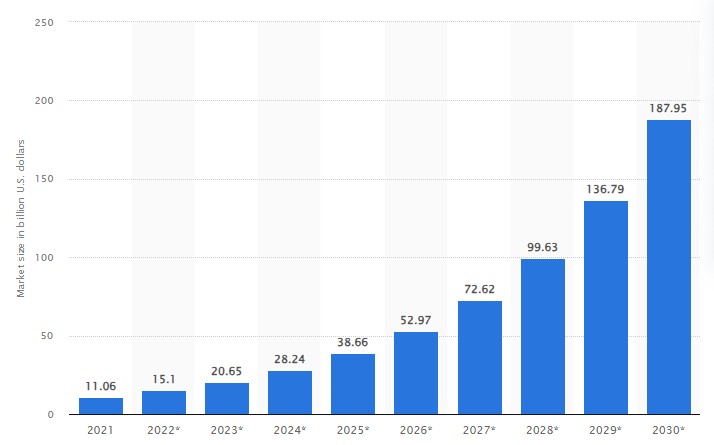
In the following article, we delve into the real-world cases of AI implementation that have sparked a seismic shift in healthcare development. By immersing yourself in these compelling real-life examples and invaluable insights, you’ll gain a deeper understanding of how new technology is revolutionizing the industry.
Let’s start!
Understanding AI in Healthcare
In the context of healthcare, Artificial Intelligence is far more complex than the neural networks we use daily. It refers to the application of advanced technologies that enable machines to perform tasks that typically require human intelligence. These techs include machine learning, neural language processing, and robotic process automation. With their help, doctors have fewer regular and routine tasks, so they can concentrate on the root of the problem.
Benefits & challenges of AI adoption
What are the actual benefits for you and other startups or product owners? In short, smart algorithms can enhance decision-making, optimize health outcomes, and lower costs. By leveraging the latest technologies, you can analyze vast amounts of data, derive actionable insights, and make more informed clinical decisions. This leads to improved patient care, increased efficiency, and enhanced patient satisfaction. Now let’s dwell on each advantage in detail:
- Enhanced diagnostic accuracy: thanks to smart algorithms, you can analyze large volumes of medical data, including images, lab results, and patient records, to assist healthcare professionals in making accurate diagnoses. This helps reduce diagnostic errors and improve patient outcomes.
- Improved efficiency and productivity: the technology automates time-consuming tasks, such as data entry, documentation, and administrative processes, freeing up professionals to focus more on direct patient care. It improves overall efficiency and productivity within healthcare organizations.
- Personalized medicine: there is no silver bullet to cure all diseases, so patients often need a special approach. With Artificial Intelligence, you can identify treatment patterns and provide personalized recommendations. Such an approach leads to improved patient outcomes and reduced healthcare costs.
- Predictive analytics and early disease detection: AI algorithms can perform data analysis to identify patterns and predict disease progression. By detecting changes at an early stage, doctors can intervene sooner, potentially preventing complications and saving patients’ lives.
- Drug discovery and development: digital brain can assist in the development of new medications by checking large datasets, predicting drug interactions, and identifying potential targets for treatment. In the race against time, such tools can create effective and targeted therapies, improving the quality of life.
- Remote patient monitoring and telehealth: with AI-powered devices and applications, doctors monitor patients’ vital signs and health conditions remotely. Since it’s not always possible to provide proper care to people, remote monitoring reduces the need for hospital visits and enables more convenient access to medical services.
- Cost reduction: new technologies have the potential to reduce healthcare costs by providing treatment optimization, resource allocation, streamlining workflows, and minimizing errors. You can automate routine tasks and improve efficiency. So it’s possible to lower operational expenses and potentially make the services more affordable and accessible.
Despite the potential benefits, you are likely to face several challenges when incorporating AI in healthcare development. Some common hardships include data privacy considerations, regulatory compliance, and the need for a skilled team. It’s better to navigate legal and ethical frameworks to ensure patient data privacy and comply with regulations such as HIPAA. Additionally, building a skilled team proficient in smart algorithms is essential for successful implementation.
Real-life cases of AI implementation in healthcare
To get all the benefits and avoid challenges, learn from your competitors. Check how they’ve implemented features, solved issues, and won the clients’ hearts. And do better.
Here are a few cases worth checking out:
AI-driven diagnosis assistance
Virtual assistant analyzes patient data, medical records, and symptoms to generate accurate and timely diagnoses. In this case, you can reduce diagnostic errors and improve patient outcomes.
Take a look at the Korean startup PMX. Its AI-based tool ChectOMx helps detect lung infection and determine its complexity, which is crucial while fighting against COVID-19, pneumonia, COPD, etc. This SaMD (software-as-medical-device) analyzes the CT scans and reports any issues automatically. As a result, the program shortens the time it takes physicians to discover degenerative disorders and cure patients.
Another case is InformAI. It focuses on cancer prevention solutions that improve radiologists’ medical diagnosis and productivity. The company offers several tools for medical imaging in different cases and diseases. For example, Rad-Onc AI assists specialists in creating head & neck radiation dose treatment plans for specific patients. With smart services, doctors can give people optimal doses with minimal risks to the tissues nearby.
AI-powered predictive analytics
Healthcare services have to deal with large amounts of data. And the numbers are often crucial when it comes to diagnostic accuracy. Artificial Intelligence can browse through vast amounts of data to identify patterns, predict diseases, and personalize treatment plans. This helps you to optimize resources and save money.
Amalfi Analytics from Spain provides technologies aimed at healthcare institutions for better decision-making. There is a tool for searching for and booking beds available at hospitals, as well as instruments for monitoring and predicting space occupation. As a result, the management and clinical decision support is more efficient, leaving no space for delays. Also, the company offers an excellent tool for HRs: it analyses absence data and predicts future absences among personnel in order to enhance planning and drastically cut expenditures.
AI-enabled robotic surgery
This is another promising area where smart algorithms are transforming healthcare. By integrating them into surgical procedures through robotic systems, doctors can enhance precision, reduce errors, and enable minimally invasive procedures. What’s more, the approach enables shorter recovery times, improved surgical outcomes, and enhanced patient safety.
Startups like CMR Surgical with their modular surgical robot help teams have better control, enhanced accuracy and deliver high-quality care. It was already used in 10 000 various operations, and the number is increasing as the creators gather more on-field data for further improvement.
AI-enhanced drug discovery
After the pandemic, people realized how vital it is to discover a cure on time. Artificial Intelligence can analyze massive datasets and simulate drug interactions, accelerating the discovery and development of new treatments. Startups leveraging expert systems in drug discovery have the potential to reduce time-to-market for medications, improve patient care, and create breakthrough treatments.
If you want to dive into this sphere, take a look at Owkin. With the help of machine learning, the company does its best to make drug research more cost-effective. AI creates various models that predict disease development and treatment outcomes. The analysis is based on real-time data from the leading hospitals in the United States and Europe while still keeping patients’ privacy.
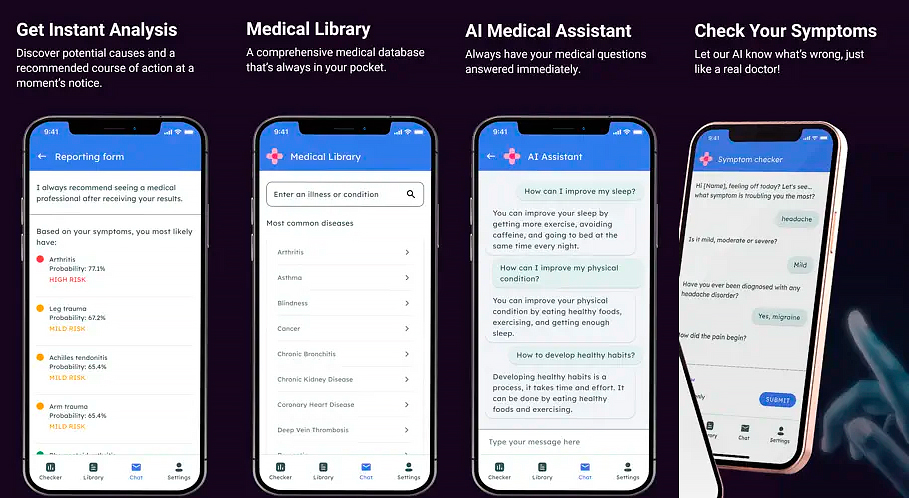
Fleming Care app
Remote monitoring and telemedicine
It’s not always possible to get timely treatment in remote areas, especially when it comes to specific diseases. AI technologies facilitate remote patient monitoring, allowing continuous collection of vital signs and other health parameters. Machine learning algorithms can analyze this data in real time, raising alerts for any deviations or potential health risks. Telemedicine platforms also utilize Artificial Intelligence for remote consultations, enabling patients to receive healthcare services while being away.
Fleming, a Lithuanian startup, specializes in enabling digital patient health monitoring and telemedicine consultations through their mobile application. The app can be integrated into wearable devices like smartwatches to provide in-depth monitoring. The company also offers a secure medical database corresponding to medical guidelines.
These are just a few examples of how AI is being utilized in healthcare development. The field continues to evolve rapidly, offering immense potential to revolutionize medical practices, improve patient outcomes, and advance the overall delivery of services.
Overcoming challenges while implementing AI in healthcare development
We’ve already mentioned a few pitfalls you might fall into on your way. Now let’s take a closer look at each of them and see how you can overcome them.
Data security and privacy: electronic health records are sensitive and subject to strict security and privacy regulations. You must implement robust data security measures to protect patient information from unauthorized access or breaches. Maintaining compliance and ensuring data privacy can be challenging, especially considering the evolving threat landscape.
Limited resources and funding: startups often face resource constraints, including limited financial resources, access to infrastructure, and skilled personnel. Developing healthcare products or services requires significant investments in research and development, regulatory compliance, and building a qualified team. Acquiring funding and attracting investors can be a hurdle, particularly in a highly competitive market.
Integration and interoperability: app development often relies on multiple disparate systems and technologies. That’s why you need to ensure seamless integration of various solutions with existing infrastructure, electronic health records (EHRs), and other IT systems. Achieving interoperability can be complex and time-consuming, requiring collaboration with various stakeholders.
Limited access to real-world data: there may be a struggle to access large and diverse datasets required to train and validate AI algorithms or develop predictive models. Limited access to quality real-life data can hinder development and healthcare efficiency.
Resistance to adoption: the industry and specialists can be resistant to change and slow to adopt new technologies. It will be hard to convince healthcare providers, institutions, and patients to trust innovative solutions. In this battle, demonstrating the value, effectiveness, and safety of the product or service is your victorious weapon.
Ethical and legal considerations: developing solutions powered by AI often raises ethical and legal concerns. You will have to address issues such as bias in algorithms, transparency of decision-making processes, and accountability. Adhere to ethical standards, promote transparency, and navigate potential legal implications associated with your products or services.
Complex stakeholder landscape: the sector involves multiple key figures, including healthcare providers, insurers, patients, regulatory bodies, and industry partners. You need to understand the diverse needs, expectations, and dynamics of these stakeholders. What’s more, aim for effective collaboration to ensure the successful adoption and implementation of their solutions.
Most companies face common challenges when integrating AI into healthcare development. Addressing these hardships is crucial for successful tech implementation.
Actionable tips and strategies for overcoming challenges
Thoroughly research the market: before diving into project creation, conduct comprehensive market research. Understand the existing landscape, including competitors, regulatory requirements, and patient needs. This research will help you identify potential challenges and opportunities.
Build a strong team: assemble people with diverse expertise, including healthcare professionals, engineers, designers, and businessmen. A well-rounded team can provide valuable insights and skills necessary for navigating the complexities of development.
Engage with stakeholders: identify key stakeholders such as healthcare providers, patients, regulatory bodies, and insurers. Get on with them early on to gain their perspectives, understand the main pain points, and involve these people in the creation process. Strong relationships will help you address concerns and ensure better adoption of your product or service.
Address regulatory compliance: there are billions of laws and rules which depend on countries, and if you aren’t following them, it will lead to significant setbacks. To avoid any issues, you have to stay up-to-date with relevant regulations, such as data privacy, appropriate medical devices, methods, and other official standards. Allocate resources to ensure your product or service meets all necessary compliance requirements.
Prioritize data security and privacy: it’s one of the key points in this industry because you deal with sensitive patient data. Electronic health records will be the cherry on the cake for scammers and cybercriminals. Implement robust security protocols, encryption methods, and access controls to protect patient information if you want to save both your reputation and patients’ info. Each country has its own privacy laws which you have to follow in order to build trust with users and avoid potential legal issues.
Test and iterate: healthcare has high-quality standards for its products. And there is a high level of competition. So thorough testing of your product throughout the development process is a must-have. Conduct user testing, gather feedback, and iterate based on the insights gained. Regularly refine and improve your offering to ensure it meets the needs of users, service providers, and other stakeholders.
Establish partnerships: to establish a renowned brand and reputation, seek to collaborate with famous healthcare organizations, research institutions, or industry experts. Partnering with experienced companies can provide access to valuable resources, expertise, and credibility, which help overcome certain challenges and accelerate your development process. These collaborations also foster knowledge exchange and ensure that AI solutions align with the needs and realities of the healthcare industry.
Secure funding strategically: creating healthcare solutions often requires significant financial resources. Of course, you need to target investors or venture capital firms specializing in the same sector. Additionally, you can explore grants, government programs, and incubators focused on startups to access financial support and valuable networking opportunities.
Stay informed and adapt: the industry is constantly evolving, with new technologies, research, and regulations emerging now and then. Stay updated on the latest trends, news, and advancements in medical technology. Remain flexible and change your development strategies to align with the market dynamics.
Embrace AI‘s potential for a positive impact: many people still have controversial feelings about Artificial Intelligence. But there is no denying that it is already changing the world for good. So you should embrace the potential of new technologies to make a positive impact on the industry. By leveraging smart applications, you can drive healthcare innovation, improve patient care, and contribute to the overall efficiency of expert systems.
In conclusion
As you can see, AI is already transforming healthcare development. It assists medical personnel with diagnostics, drug discovery, and timely treatment, making the life of patients easier. If you want to create a product that provides utility and actually helps people, then this sphere is a perfect choice.
However, to stay at the top of the food chain, you need to embrace the full potential of AI against all prejudices, collaborate with healthcare institutions, and stay updated with the latest advancements in the field. By harnessing the algorithms’ power, you can play a vital role in shaping the future of healthcare and revolutionizing the way it is provided and received. To explore more about Artificial Intelligence in medicine, consider relevant online courses like the AI for Medicine Specialization on e-learning platforms like Coursera. It will help you gain a deeper understanding of such applications, so you will unlock new opportunities and contribute to the ongoing transformation of the industry.
It’s time to make a positive impact on healthcare by harnessing the power of AI. Contact us and let’s create a versatile application that combines powerful features and high utility.

